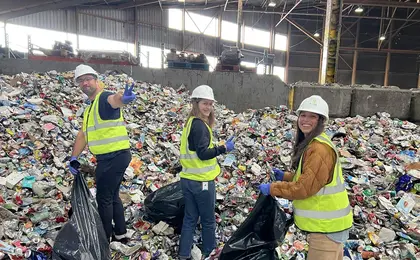Companies that see sustainability as a strategic imperative and opportunity will thrive in coming decades. To lead in your organization and make sustainability not a question of corporate responsibility but one of corporate success, you need to combine in-depth understanding of markets and organizations with a grasp of major trends and a facility with frameworks for driving transformative innovation.
Our curriculum

Questions of sustainability, climate change, and environmental justice are woven throughout the curriculum through case studies, exercises, and examples drawn from current events. The school's degree programs focused on climate and sustainability, as well as close connections with other schools at Yale, including the School of the Environment, mean there is always a critical mass of interest and expertise.
Sample courses
-
Foundational courses: State and Society, The Executive
-
Electives: Business and Environment: Management and Strategy, Energy System Analysis, Regulation in the Modern Economy, Strategies for Land Conservation, Financing Green Technologies
Sustainability Video Moments




Community stories

Society’s current challenges in sustainability, LGBTQ+ rights, and equal opportunity are what matter most to me, and they’re motivating my career journey.
Small holder farmers understand the negative impacts of climate change. They very much value their ecosystems. Our job is really to build a buying relationship for them where it actually makes financial sense for them to engage in conservation-based agriculture.

Sustainability programs
MBA/MEM or MF
Yale University created the first joint management-environment degree in 1982, recognizing the importance of integrating the two disciplines. The joint-degree program is intended to prepare business leaders and environmental managers with the tools to address the complex relationship between markets and the environment. The joint-degree program offers an MBA in combination with either a master of environmental management (MEM) or a master of forestry (MF).
Yale MBA for Executives: Sustainability
The Yale EMBA program features the same powerful combination of integrated curriculum, leadership development, raw cases, team projects, and deep expertise in global business as the full-time MBA program. Additionally, it draws on expertise from across Yale and beyond to provide students with the opportunity to deepen their knowledge in one of three focus areas: asset management, healthcare, or sustainability.
Executive Education
In 2021 Yale School of Management Executive Education launched a series of short, asynchronous online programs designed to answer the needs of working professionals for a deeper understanding of the role sustainability plays in critical business functions. Led by Todd Cort, Senior Lecturer in Sustainability at the Yale School of Management with a courtesy appointment at the Yale School of the Environment, Corporate Sustainability Management: Risk, Profit, and Purpose and Sustainable Finance and Investment are the first two executive programs in this series.
Yale Center for Business and the Environment
The Yale Center for Business and the Environment convenes diverse resources and skill sets from the Yale School of Management and the Yale School of the Environment. The center provides a platform for generating, incubating, and launching innovative action at the intersection of business and the environment. Its work is necessarily global, spanning five continents and the gamut of business sectors, from increasing supply chain sustainability to greening the financial sector.
Opportunities for Students
The Energy Club aims to keep students up to date on trends, policy, and regulation changes, and other major issues relevant to the energy industry. The club brings in speakers to share their expertise in regular “Energy 101” lectures and also offers networking opportunities.
The Responsible Investing Group provides students with the information and skills they need to carve a space in the emerging sustainability and responsible investing career sectors. The club also hosts the Low-Carbon Case Competition and the Responsible Investing Conference.
The Responsible Investing Conference, a student-run conference led by the Responsible Investing Group, convenes scholars and industry experts at Yale SOM to discuss how capital can drive social innovation and change.
The Low-Carbon Case Competition, part of the Responsible Investing Conference, challenges teams of students from top U.S. business schools to consider ways to address climate change while meeting investors’ expectations.
The Yale Environmental Sustainability Summit (YESS) engages university alumni, faculty, staff and students—as well as outside experts, practitioners, and scholars—to tackle these topics about sustainability.
Sustainability Resources Across Yale
Yale Center for Business and the Environment • Yale Center for Environment Law & Policy • Center for Green Chemistry & Green Engineering at Yale • Yale Sustainable Food Program • Center for Industrial Ecology at Yale FES • Hixon Center for Ecology at Yale FES • Urban Resources Initiative at Yale FES • Yale Forest Forum • Tropical Resources Institute • Environmental Leadership & Training Initiative • The Forest Dialogue • Yale Forests • Yale Project on Climate Change Communication














